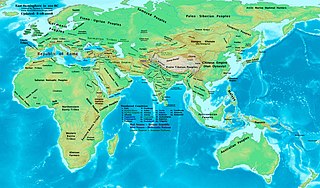Related Research Articles

The 1st century BC, also known as the last century BC, started on the first day of 100 BC and ended on the last day of 1 BC. The AD/BC notation does not use a year zero; however, astronomical year numbering does use a zero, as well as a minus sign, so "2 BC" is equal to "year –1". 1st century AD follows.

This article concerns the period 49 BC – 40 BC.
This article concerns the period 59 BC – 50 BC.
This article concerns the period 69 BC – 60 BC.
This article concerns the period 79 BC – 70 BC.
This article concerns the period 109 BC – 100 BC.

Year 87 BC was a year of the pre-Julian Roman calendar. At the time it was known as the Year of the Consulship of Octavius and Cinna/Merula. The denomination 87 BC for this year has been used since the early medieval period, when the Anno Domini calendar era became the prevalent method in Europe for naming years.
Year 82 BC was a year of the pre-Julian Roman calendar. At the time it was known as the Year of the Consulship of Marius and Carbo. The denomination 82 BC for this year has been used since the early medieval period, when the Anno Domini calendar era became the prevalent method in Europe for naming years.
Gnaeus Pompeius Strabo was a Roman general and politician, who served as consul in 89 BC. He is often referred to in English as Pompey Strabo, to distinguish him from his son, the famous Pompey the Great, or from Strabo the geographer.
The Populares were a political faction in the late Roman Republic who favoured the cause of the plebeians.
Gnaeus Octavius was a Roman senator who was elected consul of the Roman Republic in 87 BC alongside Lucius Cornelius Cinna. He died during the chaos that accompanied the capture of Rome by Cinna and Gaius Marius.

Gaius Marius "the Younger" was a Roman general and politician who became consul in 82 BC alongside Gnaeus Papirius Carbo. He committed suicide that same year at Praeneste, after his defeat by Lucius Cornelius Sulla.
Quintus Caecilius Metellus Pius was a Roman politician and general. Like the other members of the influential Caecilii Metelli family, he was a leader of the Optimates, the conservative faction opposed to the Populares during the last century of the Roman Republic.

The gens Pompeia was a plebeian family at ancient Rome, first appearing in history during the second century BC, and frequently occupying the highest offices of the Roman state from then until imperial times. The first of the Pompeii to obtain the consulship was Quintus Pompeius in 141 BC, but by far the most illustrious of the gens was Gnaeus Pompeius, surnamed Magnus, a distinguished general under the dictator Sulla, who became a member of the First Triumvirate, together with Caesar and Crassus. After the death of Crassus, the rivalry between Caesar and Pompeius led to the Civil War, one of the defining events of the final years of the Roman Republic.

This is a historical timeline of Portugal.
This article concerns the period 99 BC – 90 BC.
Gaius Marcius Censorinus was a late Roman Republican politician and soldier who participated in the first civil war of the Roman Republic, against Sulla.